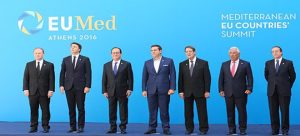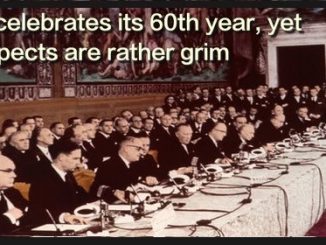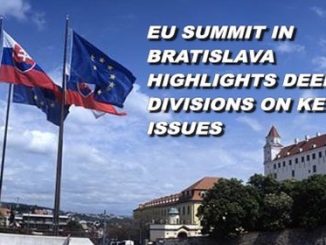
ALEX GORKA
Europe is at a critical crossroads facing economic stagnation, social problems, and the rise of Euroscepticism and strengthening of far-right populist phenomena. The emergence of new alliances within the EU is gaining momentum to change the political landscape of the Continent. With no unity, the very relevance of the bloc is put into question. Today, the EU appears to become a loose alliance of «camps» and «groups» pursuing different aims.
The prime ministers of the Visegrad Group (Poland, Hungary, Czech Republic and Slovakia) known for its repeated condemnations of the EU’s immigration and security policies, met on the margins of an economic forum in the Polish town of Krynica (Sept. 6-8) to agree on a joint position at the September 16 Bratislava summit on the EU’s post-Brexit future.
Hungarian Prime Minister Viktor Orban, said Brexit «offered the opportunity to correct mistakes by the EU», which he described as «rich but weak». The Visegrad group speaking with one voice to call for reforms was the first alarm bell.

It did not take long for the second bell to ring. On September 9, Greece hosed an EUMED meeting in Athens to bring together the leaders of Greece, France, Italy, Spain, Portugal, Cyprus and Malta before the Bratislava event. Greek Prime Minister Alexis Tsipras called for policies to foster growth, saying the summit participants needed to have a bigger say in the future of Europe.
He aims to gain support for an anti-austerity push, a direct challenge to Germany’s demand for increased belt-tightening. A day before the summit attended by a total of seven EU Mediterranean states, Tsipras had also dug into the German leadership in an interview with France’s Le Monde. «We must collectively agree if we are a European Union or a German Union», he said.
According to Greek PM, “Our countries have in recent years been disproportionately affected by the economic crisis… and are on the front line of migratory flows. We were on the front line of the parallel crises which have tested Europe». The Greek leader believes that, «In such a debate, Europe’s Mediterranean countries can and must raise their voice. The way to have a bigger say is to seek a common approach and common positions».
The EUMED countries issued the Athens Declaration, focusing on policies to promote growth and employment by stimulating demand and output to relieve growing socio-political instabilities. The document reflects the north-south and east-west centrifugal tensions exacerbated recently. The idea of southern front floated by Greek Prime Minister Alexis Tsipras at the August meeting of European socialist leaders is supported by French President François Hollande and Italian Prime Minister Matteo Renzi.
In France, the governing Socialists are in deep trouble ahead of next May’s elections for their alleged submission to Germany, and their inability to stimulate faster growth and larger employment.
In Italy, the opposition Five Star Movement (M5S) is gaining strength. It is joining the Northern League’s (Lega Nord) call to exit the EU. Having won 19 of the 20 mayoral elections last June, including Rome and Turin, M5S is now polling at 30.6 percent, slightly ahead of the governing Democratic Party’s 29.8 percent.
There is one more thing that unites the Mediterranean EU members. Actually, they all speak out against the anti-Russia sanctions. Both chambers of the French parliament have voted for the cancellation of the restrictive measures. Similar resolutions have been voted for in the regional parliaments in Italy (Veneto, Liguria and Lombardy) as well as in the Parliament of Cyprus. With fiscal policies dictated from Brussels, foreign trade acquires special importance for these states. The loss of Russia’s huge internal market happened to be a heavy loss for the southern EU members.

The pro-growth agenda offered by the EUMED countries is likely to deepen public deficits, which is not authorized under the Stability and Growth Pact – a set of rules designed to ensure that countries in the European Union pursue sound public finances and coordinate their fiscal policies. It’s also a no-go for some EU countries led by Berlin. Asked to comment on the EU-Med Summit aimed at tackling serious EU problems regarding migration, extremism and austerity, German Finance Minister Wolfgang Schaeuble appeared derogatory in reference to what some labeled «Club Med.» «When socialist party leaders meet, nothing terribly intelligent comes out of it most of the time», he told a press gathering.
Manfred Weber, the head of the European People’s Party, was even less optimistic. «Alexis Tsipras is once again playing the little games he knows so well», said Weber regarding the summit called in Athens. «What Europe needs right now is a message of unity, not new efforts to divide it.» Germany’s EU Commissioner Guenther Oettinger also expressed unease about the Athens meeting. “It would not be good if the divide deepened between EU member countries with big budget problems …and those with minimal fiscal issues,” he told the Passauer Neue Presse.
But the very fact that such big countries as France and Italy joined the Mediterranean Club (Club Med) reflects the trend to deep divisions inside the EU ranks. The challenge to the current pattern with Berlin calling all the shots is growing stronger. The northern European countries are mulling the idea floated by the Dutch government to form a post-Schengen (if not post-EU) Europe to include only the «northerners» – the Netherlands, Belgium, Luxembourg, Germany and Austria – the nations that share deep cultural and historic links. They also have common views on financial and economic issues.
New divisions, groups and fault lines are likely to emerge in the debate on the future of Europe that will reveal differences between countries. The member states situated in the north of the Continent want a strong European federation with a united defence force, a common foreign policy, a small but powerful European government and a fully-fledged European treasury with its own resources (instead of the current European budget of 1% of GDP funded by national contributions).
The southerners or expansionists, such as Greece, Italy, Spain, French Socialists, and Portugal, want less restrictive EU borrowing rules and greater flexibility to prop up their banks. They strive for more growth and more investment, less austerity and less bureaucracy. The more Eurosceptic Visegrad countries – Hungary, Poland, Slovakia and the Czech Republic – are well organized and unanimous in their views that the member states, not EU institutions, should form the basis of the bloc.

Viktor Orban
Hungarian PM Victor Orban believes that «The EU is not in Brussels, but in the 27 capitals.» According to him, the efforts to create democratic legitimacy for the EU institutions have failed, and the European parliament should include nationally elected politicians. European populists, such as the far-right Front National (FN) in France, the Alternative für Deutschland (AfD) in Germany’s and the Italy’s 5 Star Movement, by and large favor a mass EU exit.
The Bratislava summit will be a decisive event to determine the EU’s nearest future. But whatever decisions are taken, the alliance will never be again the EU the world once knew. The bloc is bursting at the seams. As events unfold, the goal of building a united and prosperous Europe speaking with one voice appears to be more of a pipe dream.
************
ER recommends other articles by Strategic Culture Foundation
About the author
Alex Gorka is a defense and diplomatic analyst
 Find out about our great (WOW) TLB Project Membership package and benefits, add your voice and help us to change the world!
Find out about our great (WOW) TLB Project Membership package and benefits, add your voice and help us to change the world!




